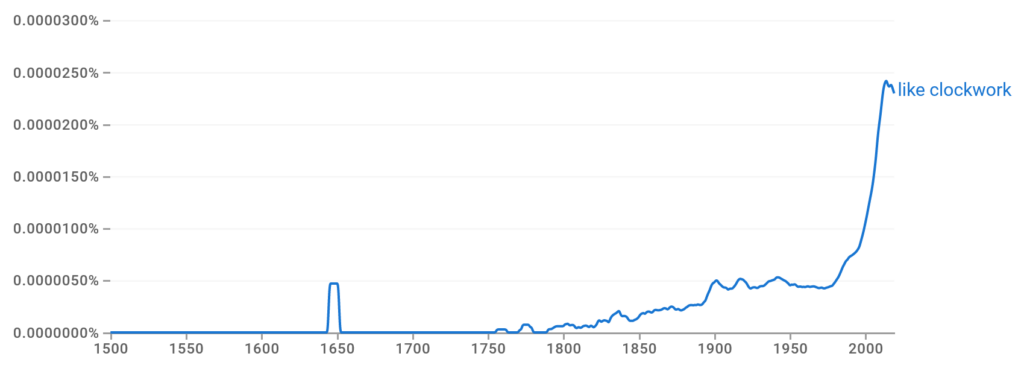Like clockwork is an idiomatic expression used to describe something occurring exactly as expected. This phrase is vividly likened to a clock’s precision, underscoring the predictability and reliability of the observed occurrence.
Idioms like this are phrases or words that describe actions or something figuratively, adding detail to language. In this case, like clockwork is used as a simile to compare two dissimilar things. These expressions enhance language richness and enable concise communication, conveying complex ideas with brevity.
This article delves into the idiom’s meaning, origin, variations, and related terms. Discover effective usage in diverse contexts and find examples across various media. So, keep reading to learn how to recognize the use of like clockwork in the English language.

What Does the Idiom Like Clockwork Mean?
The idiom like clockwork means that something happens repeatedly with regularity, precision, and predictability, similar to a clock’s dependable and precise workings.
The idiomatic expression like clockwork (also expressed as went like clockwork) has multiple interpretations. According to Merriam-Webster, it means to “succeed” or “turn out as planned or desired.” Collins Dictionary defines it as something that happens “without any problems or delays, or happens regularly.”
When we use like clockwork in a sentence, it is usually considered a simile to describe the execution of a plan in a perfect fashion, without any unforeseen problems. Its literal use refers to the machine-like regularity and precision of a clock.
Variations of the Idiom
These variations maintain the essence of regularity, precision, and predictability conveyed by the original idiom like clockwork.
- As regular as clockwork
- Like a Swiss watch
- Went like clockwork
- As precise as clockwork
- With clockwork precision
- As smoothly as clockwork
- Operating like clockwork
How Is Like Clockwork Commonly Used in Context?
The idiomatic expression like clockwork finds versatile applications in everyday language, capturing the essence of precision and regularity. Explore the following sections to unravel the various contexts where this phrase seamlessly integrates into both spoken and written communication:
What Are the Different Ways to Use Like Clockwork?
When using the idiom like clockwork, be sure it is in a context that emphasizes a sense of regularity, precision, dependability, and predictability.
- Punctual events: Meetings start like clockwork.
- Predictable patterns: The train arrives daily like clockwork.
- Smooth operations: The assembly line works like clockwork.
- Regular maintenance: Tasks are completed like clockwork.
- Consistent performance: He delivers results like clockwork.
Where Can You Find Examples of Like Clockwork?
Examples of the phrase like clockwork can be found in various written and spoken contexts. Here are a few sources where you can find examples:
- Literature and fiction
- News and magazine articles
- Conversations and dialogues
- Scientific and technical literature
- Personal accounts and biographies
- Online forums and discussion boards
Online journalism and social or gossip-related articles often use the expression as well:
Since her eponymous debut album was released in 2006, Swift has released a new album almost every two years, pretty much like clockwork. (The Observer)
He has famously become interchangeable with Mateo Kovacic – the 60–minute Sarri switcheroo as regular as clockwork – and the style the Chelsea manager insists upon appears to limit what Barkley does best. (The Daily Mail)
What Are Some Tips for Using Like Clockwork Effectively?
By following these tips, you can use the phrase like clockwork effectively to convey the idea of precision, regularity, and dependability in various situations.
- Contextualize the phrase: Provide sufficient context so that the meaning of like clockwork is clear to your audience.
- Be specific: To make your statement more impactful, provide specific details about the event or process that occurs like clockwork.
- Vary the context: While the phrase typically describes predictability, you can add depth and interest by using it in different contexts.
- Combine with action: To emphasize the reliability and predictability of an event or process, consider combining the phrase with action verbs.
- Use in appropriate situations: Reserve the phrase for situations where predictability and regularity are relevant and meaningful.
- Maintain consistency: When using the phrase like clockwork, ensure that the event or process occurs regularly and predictably.
What Is the Origin of the Idiom Like Clockwork?

The origin of the idiom like clockwork can be traced to the word “clockwork,” denoting the inner workings of a mechanical mechanism, particularly mechanical clocks. The idiom itself emerged in the mid-1700s.
The precise origin of the phrase is challenging to pinpoint, but it likely transitioned from a literal usage to a figurative one as a popular informal expression in speech. The Oxford English Dictionary provides documented uses of clockwork in both literal and figurative contexts.
For example:
Item paid to the man thatt made the cloke werke and dyell (1516) / Rye Churchwardens’ Accts. in Antiquarian Horol. (1976) Winter 50/2
Thus we see in this curious clockwork of Iustice, the least pin or wheele amisse may distemper & disorder all (1618) / S. Ward, Iethro’s Iustice of Peace 57
How Did the Idiom Evolve Over Time?
Originating in the mechanical precision of clocks, the idiom like clockwork made a seamless shift from literal to figurative usage. Emerging in the mid-1700s, it evolved into a metaphor for precision and predictability in various aspects of life, as seen in early examples from 1516 and 1618.
What Are Some Related Terms to Like Clockwork?
To deepen your grasp of using like clockwork in sentences, explore synonymous expressions. These alternatives provide nuanced ways to convey precision and regularity in diverse contexts.

Synonyms
- Regularly
- Dependably
- Predictably
- Consistently
- Reliably
- Steadily
- Systematically
Antonyms
- Erratically
- Unpredictably
- Inconsistently
- Sporadically
- Haphazardly
- Chaotically
Like Clockwork: Test Your Knowledge!
Choose the correct answer.
Let’s Review
Like clockwork is an idiomatic expression that refers to something happening with regularity, precision, and predictability. It is often used to describe events or processes that occur without fail or deviation.
Its use encapsulates the idea of a well-oiled and dependable mechanism where actions or events unfold precisely and expectedly. It conveys a sense of stability and consistency and has been used in such a manner since at least the 17th century. Its literal roots refer back to the innermost workings of a mechanical clock, a timepiece that people had grown to depend on.
